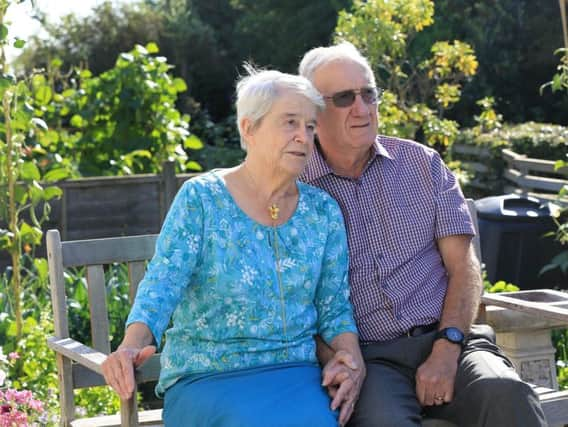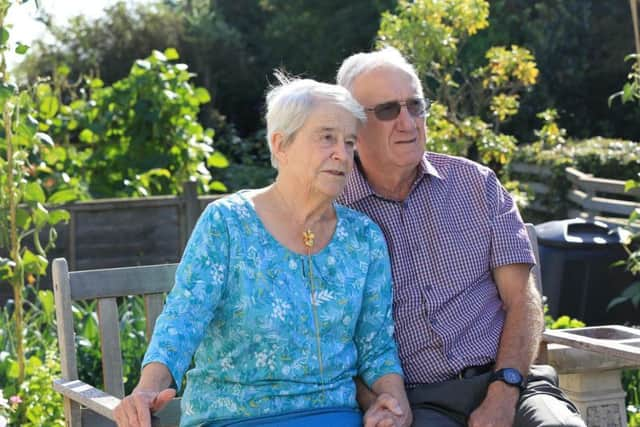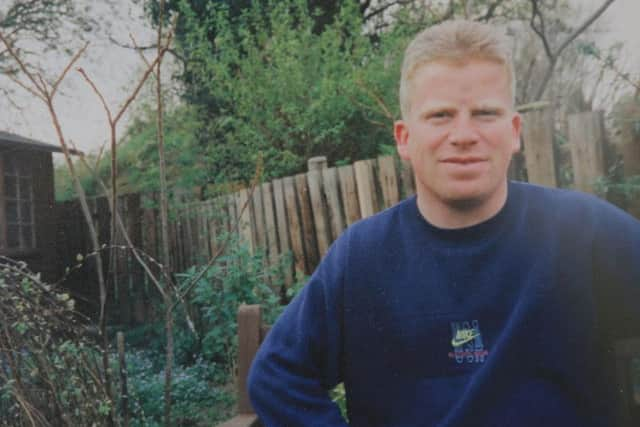How pioneering Leeds gambling service is helping families in despair


For years, Anne Evans did all she could to assist her son Alan as he dealt with a spiralling gambling addiction that got to a point where he was overdrawn on six credit cards and eventually saw him lose his job and his home. But after finding it impossible to get any professional help for him, Alan killed himself in 2010 at the age of 40.
Following the tragedy Anne has spent the last nine years campaigning for better support for problem gamblers and their families – meaning that the opening of a pioneering new service in Leeds earlier this month that provides exactly that was a deeply emotional moment.
Advertisement
Hide AdAdvertisement
Hide Ad“It has taken nine years to get this far, it has been a long struggle,” she reflects on the opening of new NHS Northern Gambling Service has launched, the first service of its kind outside London.


Children in Yorkshire at risk of becoming gambling addictsSupported and hosted by Leeds City Council and run by Leeds and York Partnership NHS Foundation Trust, it is being jointly funded by NHS England and charity GambleAware in an agreement worth around £1m a year, with further bases due to open in Manchester and Sunderland next year.
Anne says it is precisely the kind of assistance her family could have done with as they struggled to get to grips with the extent of Alan’s problem.
“Gambling grew into an addiction Alan couldn’t control until it absolutely destroyed his life and he ended it in 2010 in despair,” she says. “I have wanted treatment services to be available for the last nine years ever since Alan killed himself. There was nothing, no help anywhere whatsoever, no publicity. Everything was kept in secret, people didn’t talk about it.”
Advertisement
Hide AdAdvertisement
Hide AdIt is estimated that in the UK there are around 340,000 people with a gambling problem and another two million ‘at risk’ of developing one but currently only two per cent are currently getting the support they need.


Alan had been a gambler since his late teenage years, starting with what had seemed to his parents a harmless hobby of playing on fruit machines. But when he started working as a car salesman, Anne and her husband Tom started to realise he had a problem as he struggled to make ends meet despite making a good living from his job, leading to a family fallout.
Tom died six weeks later and Alan, estranged from his family, was running a café – using the profits to bet in the bookies next door and getting into further financial difficulties. In 2010, to Anne’s great devastation, he took his own life.
Why levy on betting firms could support people addicted to gambling - The Yorkshire Post saysIn 2012 Anne remarried and she and her husband Keith tried all avenues for help for people in the same situation, setting up a charity called the Young Gamers & Gamblers Education Trust which works to educate young people and those who work with them about the facts and dangers of gambling and gaming and how to gamble responsibly.
Advertisement
Hide AdAdvertisement
Hide AdShe has also worked with Leeds City Council and other stakeholders to get the new service off the ground. “Leeds Council have done a tremendous job rising to the challenge of providing help to gamblers and their families because gambling destroys families. It destroyed mine and it took a lot of rebuilding.”
Among others who have welcomed the arrival of the new service is 32-year-old Chris Murphy from Leeds. Now a successful sports journalist and darts commentator, Chris attempted suicide in his early 20s as his gambling addiction spun out of control.
He says: “I first started gambling when I was 17 and I can still remember my first bet – a £2 accumulator which won me £350. To me that was a lot of money and it felt amazing. I think I became addicted immediately, but I don’t think it was as simple as it sounds.”
Despite being thrown out of college due to missing lessons through gambling, Chris got a job and lots more disposable cash. On his 18th birthday, he took out a bank loan and started gambling every day.
Advertisement
Hide AdAdvertisement
Hide AdHis family intervened when he was 19 and his mum drove him to a gambling support group but he would not attend the meetings and go gambling instead, tricking himself into believing he could make it into a living but instead falling further into debt.
At 23 he decided to try and win enough to pay off everything he owed. Incredibly he succeeded but he couldn’t walk away from the addiction. During the 20 minute wait for the bus home, Chris decided to place another bet – and lost everything.
Keep gaming free of addictive add-ons to avoid another gambling epidemic – Yorkshire campaigner Adam BradfordHe tried to kill himself but fortunately was found in time. He went home to his parents and he returned to the gambling support group. For 18 months he avoided gambling and started at university but then relapsed after taking out a student loan and losing all the money he was able to access that day. His recovery became a repeated cycle of months of abstinence interrupted by relapses.
Chris is now going to a different support group, attending several meetings weekly and seeing a counsellor as well. He has also given up drinking and so far has been several months drink and bet-free.
Advertisement
Hide AdAdvertisement
Hide AdHe says: “The new NHS service is important because it will help people at point of crisis when they need it. Gambling addiction should be treated as a health issue. If recovery is only based on physically preventing gambling, it’s just papering over the cracks.”
Nathan Barnes, a 27-year-old gym instructor from Leeds, has a similar story. After catching the gambling ‘bug’ with a win on the Grand National when he was 18, he became “absolutely hooked” on not only betting on sports but also using slot machines and, in particular, fixed-odds betting terminals (FOBT), which are types of electronic slot machines.
After losing a month’s wages on one of a FOBT he took out an emergency loan to spend more on gambling in an attempt to recover his losses and his problems exacerbated. He ended up sleeping on his brother’s floors after racking up debts that included three bad debt credit cards, a high interest credit union overdraft, a standard overdraft and four payday loans and £4,500 of tuition loans.
He says he finally admitted he had a problem in April 2018 when he spoke to a customer at his gym with terminal cancer. “He was simply in the gym to prolong his life. I didn’t know what to do with myself. After he left I was sat in my office in a flood of tears. How he handled life and the cards he had been dealt was inspiring, and there I was wasting my life trying to win money from companies designed to take my money from me.”
Advertisement
Hide AdAdvertisement
Hide AdHe vowed never to gamble again and confessed everything to his friends and family. He says that he has supported by his partner and his family in his recovery, while he was also given a course of anti-depressants through the NHS.
But Nathan says the service is a major step forward in helping problem gamblers and their families. “It’s wonderful that the NHS is now investing in treating problem gamblers. Hopefully now the term ‘Gambling addict’ is taken much more seriously.”
Proper treatment can greatly increase the chances of recovery from gambling addiction, says consultant psychologist Matthew Gaskell, who is the clinical lead for the new NHS Northern Gambling Service.
“Gambling is causing serious harm to thousands of people across the UK. This includes mental health problems, serious debt, breakdown of relationships, loss of employment, crime, homelessness and sometimes suicide.
Advertisement
Hide AdAdvertisement
Hide Ad“However the chances of recovery from addictions like problem gambling can be very good with proper treatment. I often see people make good sustained recoveries if when they seek help. I’m proud to be involved in this much needed service.”